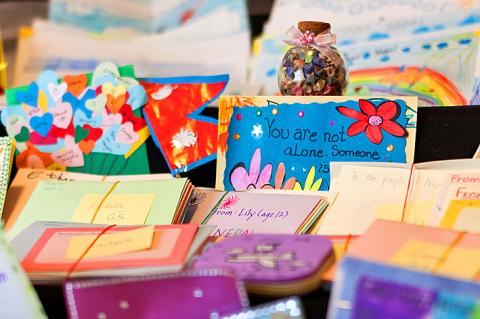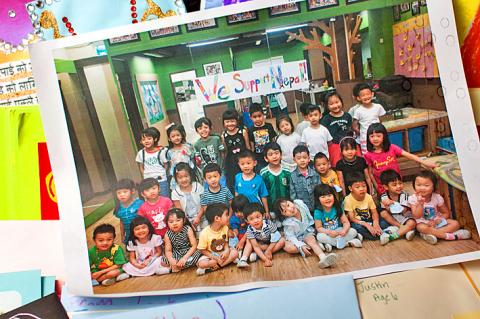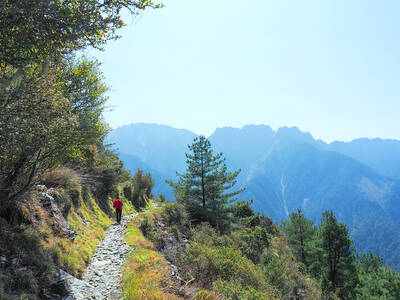Malinda Schultz has come up with a novel way to show sympathy with those affected by the magnitude 7.9 quake that hit Nepal in April.
Letters4Nepal, a letter-writing campaign she initiated following the devastating quake that killed thousands and displaced tens of thousands, has students from Taiwan write letters to those in the hardest-hit areas, which are then delivered through a US-based non-profit (letters4nepal.wordpress.com).
The project, which has already produced over 500 letters from Taiwan, encourages students to “provide some hope and let them know that somebody cares,” Schultz, 33, tells the Taipei Times by phone from Hsinchu where she lives.

Photo courtesy of Jeff Harris
She adds that the campaign is a way to “to inspire and to give courage to youth ... especially for kids who have lost everything,” while providing an opportunity for students in Taiwan to learn about another country’s language, lifestyle and religion.
‘YOU ARE NOT ALONE’
The letters, some colorfully illustrated with children dancing on rainbows, others with reflective baubles pasted to cardboard flowers, are written mostly in English with a sprinkling of Chinese and Nepali.

Photo courtesy of Jeff Harris
One student named Melody entreats her readers to be “brave,” while Ryan writes, “I know you are very sad, but you are not alone.” A third letter signed by Olivia reads “We come from Taiwan. We will take care of you.”
Schultz, who has traveled and taught in Nepal, is no stranger to helping others.
The full-time mother of three has organized art classes and photography workshops for Atayal children and held music festivals to draw attention to animal rights.

Photo courtesy of Jeff Harris
Being active in the community has helped her develop a network of like-minded expats, teachers who have “traveled the world and want to do something good.” After coming up with Letters4Nepal, she used social media to send the word out to teachers who would be willing to devote class time to have students prepare the letters.
Schultz cites Taipei’s Treehouse Academy as an example of a school that really jumped on board with the project. With its principal leading the charge, the school produced over 150 letters.
GLOBAL EFFORT
But Schultz says this is just the beginning. Having already convinced friends from the US to join the project, which has produced an additional 200 letters, she has called on contacts from Thailand, Australia and Costa Rica to join in.
Schultz says that with a one-year old to care for, she won’t be able to travel to Nepal to distribute any of the letters. But she is in touch with former students who have agreed to work with the foundation to distribute the letters — and in some cases, because many of those affected by the earthquake are illiterate, read them out loud.
“A letter is going to make a difference,” Schultz says with conviction.
“If they have one happy letter to look at for the rest of their lives — whether long or short — at least they have something.”
The letters will be sent to Nepal through the Bishwa Seva Foundation, a US-based nonprofit that raises funds to provide educational and dietary needs to the country’s underprivileged children in Panauti where they collaborate with a secondary school.
Letters can also be sent directly to the organization in Oceanside, California, care of the Bishwa Seva Foundation, PO Box 703 Oceanside, CA 92049.

“Why does Taiwan identity decline?”a group of researchers lead by University of Nevada political scientist Austin Wang (王宏恩) asked in a recent paper. After all, it is not difficult to explain the rise in Taiwanese identity after the early 1990s. But no model predicted its decline during the 2016-2018 period, they say. After testing various alternative explanations, Wang et al argue that the fall-off in Taiwanese identity during that period is related to voter hedging based on the performance of the Democratic Progressive Party (DPP). Since the DPP is perceived as the guardian of Taiwan identity, when it performs well,

The Taiwan People’s Party (TPP) on May 18 held a rally in Taichung to mark the anniversary of President William Lai’s (賴清德) inauguration on May 20. The title of the rally could be loosely translated to “May 18 recall fraudulent goods” (518退貨ㄌㄨㄚˋ!). Unlike in English, where the terms are the same, “recall” (退貨) in this context refers to product recalls due to damaged, defective or fraudulent merchandise, not the political recalls (罷免) currently dominating the headlines. I attended the rally to determine if the impression was correct that the TPP under party Chairman Huang Kuo-Chang (黃國昌) had little of a

At Computex 2025, Nvidia CEO Jensen Huang (黃仁勳) urged the government to subsidize AI. “All schools in Taiwan must integrate AI into their curricula,” he declared. A few months earlier, he said, “If I were a student today, I’d immediately start using tools like ChatGPT, Gemini Pro and Grok to learn, write and accelerate my thinking.” Huang sees the AI-bullet train leaving the station. And as one of its drivers, he’s worried about youth not getting on board — bad for their careers, and bad for his workforce. As a semiconductor supply-chain powerhouse and AI hub wannabe, Taiwan is seeing

Jade Mountain (玉山) — Taiwan’s highest peak — is the ultimate goal for those attempting a through-hike of the Mountains to Sea National Greenway (山海圳國家綠道), and that’s precisely where we’re headed in this final installment of a quartet of articles covering the Greenway. Picking up the trail at the Tsou tribal villages of Dabang and Tefuye, it’s worth stocking up on provisions before setting off, since — aside from the scant offerings available on the mountain’s Dongpu Lodge (東埔山莊) and Paiyun Lodge’s (排雲山莊) meal service — there’s nowhere to get food from here on out. TEFUYE HISTORIC TRAIL The journey recommences with